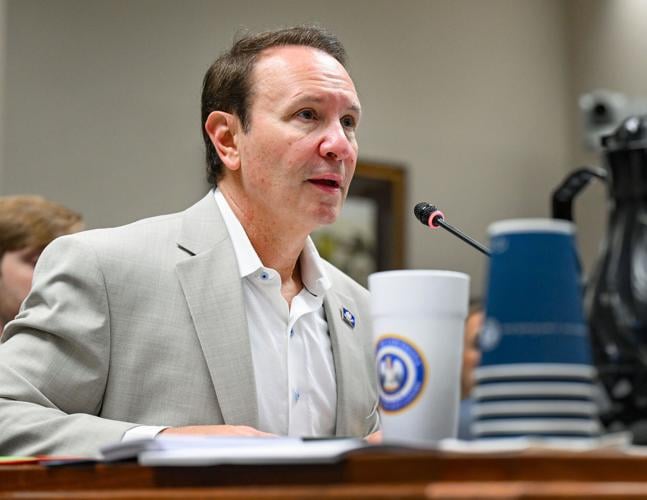
Gov. Jeff Landry
Editor's note: This story has been updated with additional information.
The old saw that "no one’s life, liberty or property is safe as long as the Legislature is in session" is not always true. It just seems that way to those who hold no sway at the Capitol.
What is always true is this: Elections have consequences.
Jeff Landry’s election as governor last autumn, along with many ultra-conservative lawmakers, signaled a sharp turn to the right in Louisiana.
In their recently concluded annual session, lawmakers dutifully rubberstamped a draconian agenda pushed by hardline social conservatives. Landry likewise got most of what he wanted, but the sheer volume of his brazen power grabs caused him to lose some of his most important bills.
Meanwhile, women and children, teachers, and LGBTQ+ people lost at almost every turn.
Which brings us to my annual tally of the session’s victors and vanquished — Da Winnas and Da Loozas — starting with …
DA WINNAS
1. Gov. Jeff Landry — The governor didn’t win all his battles, but lawmakers approved enough of his ambitious agenda to make him the Big Winna this year. Landry also helped his key political backers get what they wanted. Social conservatives and theocrats got the nation’s strictest anti-abortion and anti-LGBTQ laws, along with a law that requires posting the Ten Commandments in classrooms. He helped trial lawyers defeat or weaken some business-backed changes to Louisiana’s legal system, while supporters of educational savings accounts (ESAs) got a scaled-down version of Vouchers 2.0. Meanwhile, the governor will soon get control of the state ethics board and nearly 150 other boards and commissions — particularly higher-ed governing boards. He also convinced lawmakers to allow him to keep his and his family’s travel schedules confidential for an unlimited time if there are security concerns. And he’s just getting started.
2. The Senate — The upper chamber, led by Senate President Cameron Henry, provided the only consistent measure of legislative independence this year. Senators killed or weakened many of Landry’s bridge-too-far initiatives, and Henry bore the governor’s ire for his colleagues. Most notably, he didn’t publicly challenge or criticize Landry. That showed real finesse. He also spared senators from having to make some tough votes and made sure the money bills got done in time to avoid the chaos that marked the final hours of last year’s session.

Senate President Cameron Henry
3. Social Conservatives and Theocrats — They are Louisiana’s Grand Inquisitors. Their iron grip on the Legislature and their ambitious ally, the governor, make them the strongest — and most feared — force in the Capitol, and they don’t shrink from demanding what they want: ever-harsher abortion restrictions and anti-LGBTQ+ laws. One new law bans trans people from using school restrooms, locker rooms or changing rooms that align with their gender identity. Another requires parental permission for students to change the names or pronouns they use in school. Yet another prohibits any talk of sexuality and gender in classrooms, extracurricular clubs and social activities in schools. For good measure, House Bill 71 requires classrooms in every public university and K-12 school to post a copy of the Ten Commandments — except the bill enumerates 11, not 10, commandments that must be posted. Does that mean students get to pick one that doesn’t count?
4. Insurance Companies — Lawmakers abolished the popular “three-year rule” that limits homeowners policy cancellations. The new law allows an insurer to not renew up to 5% of its total policies per calendar year, but insurers must get Insurance Commissioner Tim Temple’s approval to drop more than 5% of their insureds in a single parish. Other new laws will allow insurance companies to raise premiums without obtaining prior approval from Temple and give them more time to pay claims — plus a “cure period” to resolve disputes with homeowners.
5. AARP — Lawmakers rejected a bill that would have shielded nursing home operators from lawsuits about staffing, poor patient care and other complaints. Critics, led by AARP, dubbed the measure the “Bob Dean Protection Act,” a reference to the man whose nursing homes sent 843 patients to an unsanitary warehouse during Hurricane Ida, leading to deaths, hospitalizations and lawsuits. As one who turns 70 in a few months, I love seeing old folks beat one of the strongest lobbies in the Capitol.
6. Organized Labor and Public Employees —
Surprisingly to many, lawmakers scuttled a set of anti-union bills that would have significantly restricted labor organizations’ activities, banned collective bargaining agreements for some public employees and made it harder for private-sector workers to unionize. Legislators also rejected Landry’s proposed constitutional amendment that would have given him more control over the state Civil Service Commission and undermined key protections for civil service workers.
7. Trial Lawyers — Some high-powered plaintiff lawyers got behind Landry early in his campaign for governor, and it paid off … for now. The governor’s tacit support helped them sidetrack or weaken several “tort reform” bills that business interests and other conservatives hoped would pass. However, this fight never ends.
8. Medical Marijuana Companies — Lawmakers approved a bill that will transfer the state’s two exclusive medical marijuana-growing licenses from LSU and Southern University to a pair of private growers the colleges had taken on as partners. Supporters of the change say it brings Louisiana into line with other states that have legalized medicinal cannabis while still allowing the universities to have a funding stream by conducting research for the new license holders.

New Orleans voters in 2016
9. Black Voters — The Louisiana Supreme Court’s seven districts hadn’t been redrawn in decades until this year. Lawmakers and Landry agreed to create a second majority-Black district — and make the districts more equal in voting-age population.
10. Election Deniers — Right-wing election deniers convinced lawmakers to sideline a bill that would have repealed parts of a 2021 law that has hobbled the Secretary of State’s efforts to acquire new voting machines, which Louisiana sorely needs. The 2021 law adds multiple layers of duplicative red tape to the purchasing process.
Which brings us to …
DA LOOZAS
1. Women and Children — Louisiana will soon become the first state to classify two abortion-inducing medications, misoprostol and mifepristone, as dangerous controlled substances. The new law criminalizes possessing those medications without a prescription, with an exception for pregnant people. Lawmakers also rejected bills creating rape and incest exceptions to the state’s anti-abortion statutes, cut about $9 million from early childhood education programs, and eliminated the state’s ability to seek, obtain or grant waivers from federal work requirements for families participating in the SNAP program.
2. Teachers — K-12 teachers went without a pay raise again this year and had to fight to maintain the one-time $2,000 stipend that lawmakers gave them last year in lieu of a raise. Compounding their woes, the new ESA law, though watered down, would still divert money from public education year to year — and potentially undermine the long-term viability of the teachers’ retirement system.
3. Transparency and Accountability — Landry sought to eviscerate Louisiana’s once-strong Public Records Law, and he nearly succeeded. One new law allows local governments to withhold records related to certain economic development projects that involve at least $5 million in capital improvements. Another allows only Louisiana residents to request public records from the governor's office.

Ben Franklin High School students gather outside their school in 2023 for a protest over anti-LGBTQ legislation.
4. The LGBTQ Community — Trans people already face many forms of bias and discrimination, but now the cruelty is further embedded in Louisiana’s statutes. From bathroom and locker room bans to prohibiting talk of sexuality and gender in classrooms, officialdom’s message to LGBTQ people is clear: You’re unwelcome and unprotected in Louisiana.
5. Gov. Jeff Landry — Enshrining his power grabs in a revised state constitution is Jeff Landry’s Holy Grail, but senators consistently said “NoNo” to the guv’s ConCon. Landry also failed to convince lawmakers to gut the entire Public Records Act, though they did inflict plenty of damage to it. Legislators watered down the governor’s sweeping ESA initiative and rebuffed his push for a proposed constitutional amendment that would have given him more appointments to the state Civil Service Commission. Don’t think for a minute, however, that Landry has given up on any of those notions.

THC seltzers and other beverages for sale.
6. The Hemp-THC Industry — THC-infused drinks and snacks have proliferated across Louisiana in recent years, prompting a push to ban such products altogether. Lawmakers balked at a total ban, opting instead for a compromise that imposes age restrictions, outlaws the sale of hemp-derived THC products in gas stations, reduces portion sizes and prohibits bars and restaurants from selling the products unless permitted to do so by June 17.
7. Ochsner Health System — The state’s largest health care system beat back previous attempts to outlaw or weaken Ochsner’s noncompete agreements, which effectively forced physicians to leave the state if they wanted to leave Ochsner. This year, Ochsner’s competitors finally convinced lawmakers to put a five-year cap on doctors’ noncompete agreements, depending on their specialties, and significantly reduce the agreements’ geographic reach.
8. Coastal Communities and Cancer Alley — A new law removes representatives of six state agencies from the Coastal Protection and Restoration Authority and adds three new “at-large” gubernatorial appointees who need no professional qualifications or coastal experience whatsoever. Meanwhile, lawmakers approved an industry-backed bill that restricts how data from community air monitors is used, despite objections from the U.S. Environmental Protection Agency and environmental activists seeking to reduce pollution in the River Parishes.
9. Private-Sector Workers — Lawmakers once more refused to hike Louisiana’s minimum wage. Adding insult to injury, they cut the duration of unemployment insurance benefits (which are already meager).
10. Higher Ed — Landry will henceforth appoint all members and chairs of public higher-ed governing boards. It will be telling to see what the governor does with this new power (besides raise wads of campaign cash). It also will be interesting to see how this change is viewed by the Southern Regional Education Board, which grants accreditation to colleges and universities.
Republican lawmakers in Louisiana seized their chance to bully trans youth, protesters, women and others during the 2024 legislative session







